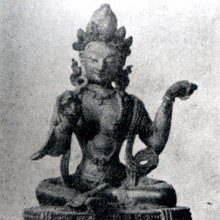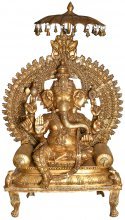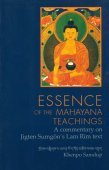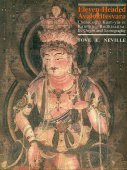Omniscience, Omniscient: 2 definitions
Introduction:
Omniscience means something in Hinduism, Sanskrit. If you want to know the exact meaning, history, etymology or English translation of this term then check out the descriptions on this page. Add your comment or reference to a book if you want to contribute to this summary article.
Images (photo gallery)
In Hinduism
Yoga (school of philosophy)
Source: ORA: Amanaska (king of all yogas): A Critical Edition and Annotated Translation by Jason BirchOmniscience refers to one of the Yogic powers obtained by those having practices for over five years, according to the Śivayogadīpikā, an ancient Sanskrit text dealing with Yoga possibly corresponding to the Śivayoga quoted in Śivānanda’s Yogacintāmaṇi.—Accordingly, [while describing a sequence of Haṭhayoga practices]: “Thus, by means of this Haṭhayoga which has eight auxiliaries, those [students who are] life-long celibates obtain the Siddhis of the [best of Sages] because of their untiring practice. [...] In the tenth [year], he can move [as fast as] his mind and cheerfully go wherever he wishes. In the eleventh year, he is omniscient (sarvajña) and a yogin who possesses the Siddhis. [...]”.

Yoga is originally considered a branch of Hindu philosophy (astika), but both ancient and modern Yoga combine the physical, mental and spiritual. Yoga teaches various physical techniques also known as āsanas (postures), used for various purposes (eg., meditation, contemplation, relaxation).
Vedanta (school of philosophy)
Source: ORA: Amanaska (king of all yogas): (Advaita Vedanta)(That which is) Omniscient is denoted by the Sanskrit term Sarvajña, according to the Māṇḍūkyopaniṣatkārikā 3.35cd-36.—Accordingly, while discussing Brahma (without attributes): “That very [mind, free of thought and restrained,] is fearless Brahma, [which is] the light of gnosis [pervading] everywhere. [It is] unborn, devoid of sleep and dreaming, unnamed, formless, manifested [all] at once and omniscient (sarvajña). [This statement] is not figurative in any way”.

Vedanta (वेदान्त, vedānta) refers to a school of orthodox Hindu philosophy (astika), drawing its subject-matter from the Upanishads. There are a number of sub-schools of Vedanta, however all of them expound on the basic teaching of the ultimate reality (brahman) and liberation (moksha) of the individual soul (atman).
See also (Relevant definitions)
Full-text (+603): Sarvajna, Sarvajnatva, Trikalajna, Sarvajnata, Kritsnavid, Kevala, Sarvavedin, Trikaladarshin, Sarvavetta, Kevali, Sarvajnatri, Trikaladarshi, Trikalavid, Kevalajnana, Sarvvajna, Sabbannuta, Sarvavidya, Kevalajnanavaraniya, Kevalajnanavarana, Mithyatva.
Relevant text
Search found 231 books and stories containing Omniscience, Omniscient; (plurals include: Omnisciences, Omniscients). You can also click to the full overview containing English textual excerpts. Below are direct links for the most relevant articles:
Maha Prajnaparamita Sastra (by Gelongma Karma Migme Chödrön)
Preliminary note on Winning omniscience and the knowledge of all the aspects < [VII. Winning omniscience and the knowledge of all the aspects]
Appendix 2 - Notes on the Buddha’s omniscience (sarvajñatā) < [Chapter I - Explanation of Arguments]
I. Difference between omniscience and the knowledge of all the aspects < [VII. Winning omniscience and the knowledge of all the aspects]
Yogadrstisamuccaya of Haribhadra Suri (Study) (by Riddhi J. Shah)
Chapter 5.4 - The Fallacious argument (kutarka) < [Chapter 5 - A Line of Demarcation between the first four and last four Yogadṛṣṭis]
Chapter 5.8 - The Omniscience (sarvajña) < [Chapter 5 - A Line of Demarcation between the first four and last four Yogadṛṣṭis]
Trishashti Shalaka Purusha Caritra (by Helen M. Johnson)
Part 4: Emancipation (mokṣa) of Nemi (Neminātha) < [Chapter XII - Baladeva’s going to heaven]
Part 7: Story of Puṇḍarīka and Kaṇḍarīka < [Chapter IX - Stories of the ploughman]
Part 4: Pārśva’s congregation < [Chapter IV - The wandering and emancipation of Pārśvanātha]
Tattvartha Sutra (with commentary) (by Vijay K. Jain)
Verse 6.13 - The nature of Faith-deluding Karmas < [Chapter 6 - Influx of Karmas]
Verse 1.12 - Pratyakṣa (direct knowledge) < [Chapter 1 - Right Faith and Knowledge]
Verse 9.11 - Eleven afflictions figuratively occur to the Omniscient Jina < [Chapter 9 - Stoppage and Shedding of Karmas]
Jainism and Patanjali Yoga (Comparative Study) (by Deepak bagadia)
Sukladhyana (pure meditation) < [Chapter 3 - Jain Philosophy and Practice]
Part 4.4 - Yogic techniques for control of Vrttis (5): Isvara-pranidhana < [Chapter 2 - Yoga philosophy and practices]
Jain Prayers < [Chapter 3 - Jain Philosophy and Practice]
Vakyapadiya of Bhartrihari (by K. A. Subramania Iyer)
Verse 3.1.46 < [Book 3 - Pada-kāṇḍa (1): Jāti-samuddeśa (On the Universal)]
Verse 3.1.45 < [Book 3 - Pada-kāṇḍa (1): Jāti-samuddeśa (On the Universal)]
Verse 3.3.56 < [Book 3 - Pada-kāṇḍa (3): Sambandha-samuddeśa (On Relation)]
Related products




